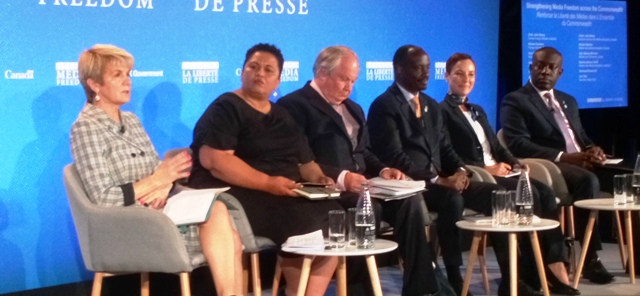 (l-r) Julie Bishop, Zoe Titus, Desmond Browne, Kojo Oppong Nkrumah, Kamina Johnson-Smith and Richard Sezibera. [photo by Debbie Ransome]
(l-r) Julie Bishop, Zoe Titus, Desmond Browne, Kojo Oppong Nkrumah, Kamina Johnson-Smith and Richard Sezibera. [photo by Debbie Ransome]
In a side room, far from the glitz and glamour of meetings attended by then prime ministerial-hopeful, Jeremy Hunt, and human rights lawyer and UK special envoy on media freedom, Amal Clooney, an afternoon session on the second day of the 10-11 July Global Media Freedom Conference looked at Strengthening Media Freedom in the Commonwealth.
The audience consisted of Commonwealth watchers, journalists with a Commonwealth perspective and diplomats. The host was UK Commonwealth Envoy for the Commonwealth Chair-in-Office, Philip Parham. Former Australian Foreign Minister, Julie Bishop, chaired the panel of Rwanda Foreign Minister, Richard Sezibera, Ghana’s Information Minister, Kojo Oppong Nkrumah, Jamaican Foreign Minister, Kamina Johnson-Smith, Desmond Browne Q.C. and Zoe Titus of the Namibian Media Trust.
The two-day conference, co-hosted by the UK and Canada, had been billed as the start of a long-term campaign on the issue of media freedom. A follow-up conference is expected to be held in Canada next year.
At the Commonwealth-focused session on day two, each foreign minister had a chance to outline how their country had laid the groundwork for a free media environment. Jamaica’s Kamina Johnson-Smith kicked off proceedings as she spoke of her country’s “well-functioning democracy”, “quite robust” media environment and the right of the Jamaican people to freedom of speech.
Rwanda’s Richard Sezibera described his country’s “incredible story” in improving its media barometer from an “inherited” and “bleak” landscape of genocide to the self regulation of the media in Rwanda. “We’ve come a long way,” he told his audience. He made mention of his government’s emphasis on the responsibilities which go with freedom of expression in a digital era when, he said, people are still hurting in Rwanda.
Ghana’s Kojo Oppong Nkrumah described the work since 1992 of putting in place a “robust” framework for his country’s media with 300 radio stations “holding our feet to the fire”. He said enhancement of Ghana’s media environment would be aimed at making sure that “quality journalism is the norm and not just the exception”. He added that mainstream media needed to be called out over “fake news”.
Media principles
The tone switched to a Commonwealth-wide perspective when Desmond Browne from the Commonwealth Media Principles Working Group outlined the work drawn up by six Commonwealth organisations. The principles paper is currently under discussions with the Commonwealth Secretariat and with Commonwealth representatives. Mr Browne said that the paper was “not a self-serving charter for journalists’ rights” but a universal set of guidelines, based on Latimer House principles.
Zoe Titus, the Strategic Co-ordinator of the Namibia Media Trust, spoke of support for freedom of expression from the highest level and of concerns that “professional journalism” needed to be the focus. She added that there were already “lots of best practices of freedom of expression in Africa and that the African Union had a model of “shared values”.
Question time
The lively Q&A session started its focus on Rwanda and media freedom. In response to questions about Rwanda and the country’s indefinite ban on BBC’s FM broadcasts in Kinyarwanda [Rwanda’s national language], Mr Sezibera said that “no journalists should be neutral in the face of genocide”.
Other questions included India’s ruling BJP party bypassing mainstream media and changing the landscape of communication, the role of bloggers in the media environment, how and whether to regulate social media and how traditional media could reach out to potential audiences who only consume their news via social media.
Debate veered back to the Media Principles, copies of which were handed out during the Q&A. Dr David Page, a senior research fellow with the Institute of Commonwealth Affairs, a member of the Commonwealth Journalists’ Association (CJA) executive and one of the lead authors of the Principles, wrote after the Commonwealth Media conference that “members of the Commonwealth working group who attended the session were pleased with the positive airing which the Principles received from the panel and the audience. The Foreign Minister of Jamaica welcomed the Principles in very complimentary terms….The Rwandan Foreign Minister, while stressing the country’s unique and complex history and its red lines on the issue of the genocide, underlined the liberal reforms which have been introduced and the country’s willingness to work with the Commonwealth on the safety of journalists”.
Held to account
After the Commonwealth panel session, a number of audience members remained to discuss the absence of some member countries with tarnished media freedom records. Discussion also focused on Rwanda’s willingness to discuss media freedom, given the country’s role as the next Commonwealth Chair in 2020.
“We do hold each other to account,” Australia’s Julie Bishop had said in wrapping up the panel session and the formal Q&A.
On the same day, at another conference session at the same venue, Pakistan’s Foreign Minister Shah Mehmood Qureshi had been challenged by a free speech activist and others from the floor on his country’s media record.
Unlike the measured debate at the Commonwealth panel discussion, the more combative tone at Mr Qureshi’s session grabbed the attention of social media and elsewhere on the closing day and the days following the media conference.
“Believe you me, there is no question of gagging or controlling media,” the Pakistan Foreign Minister had told his session as he was challenged from the floor on his country’s media record.
“That time has gone and with the new social media, the advent of social media, even if you want to gag you can gag nothing.”
Related articles
A Global Conference for Media Freedom



